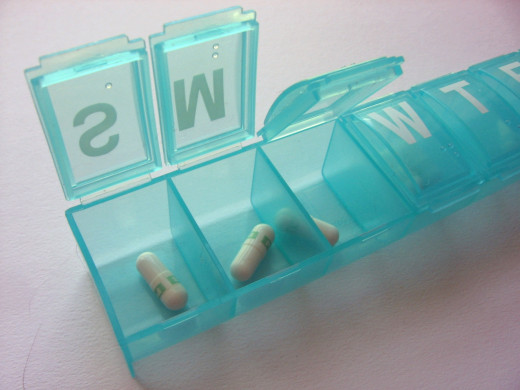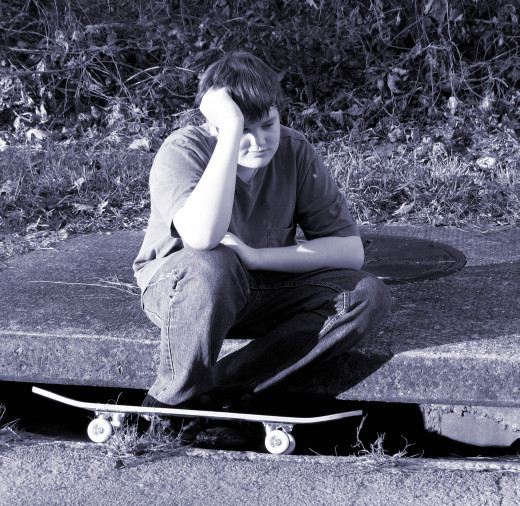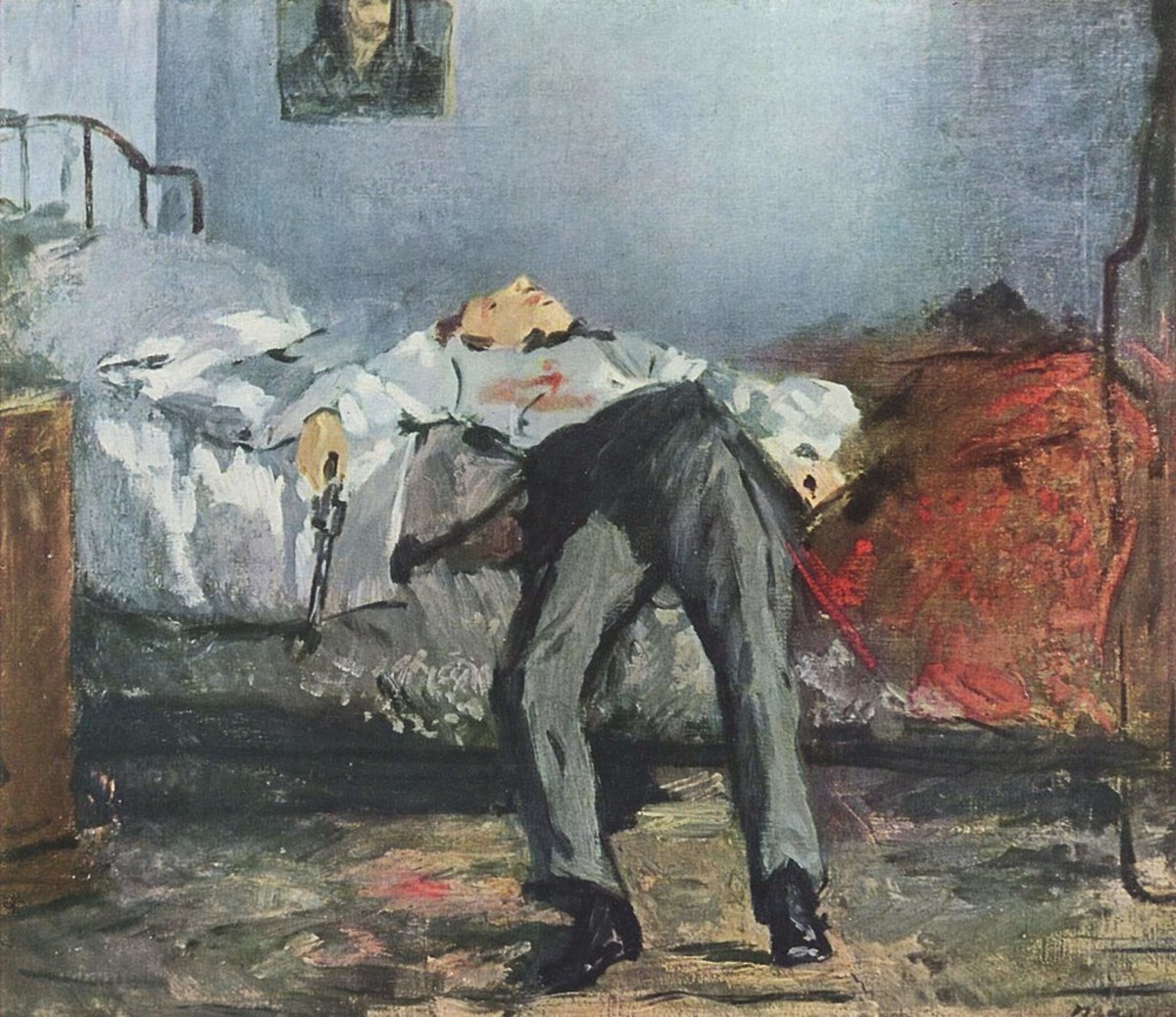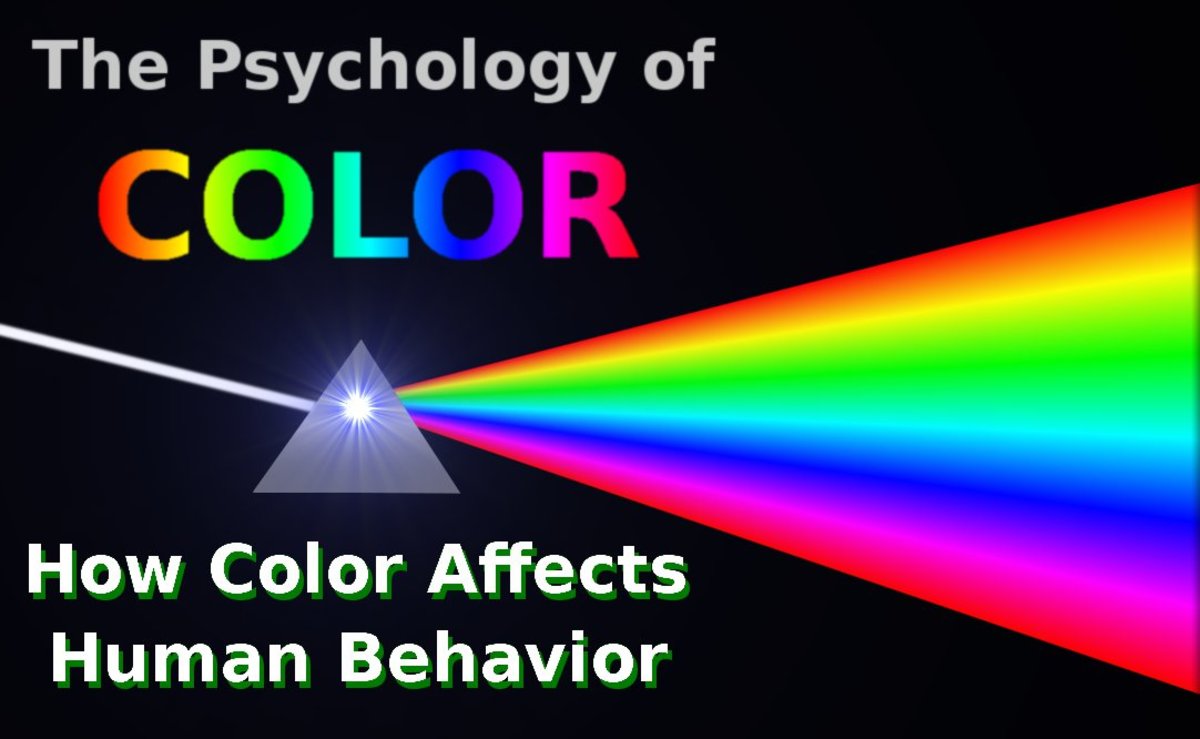Learn About Depression: Treating and Overcoming with Self Help

An Introduction to Depression
Depression is a mood illness. It causes symptoms such as sadness, irritability, anger, low self esteem, and suicidal thoughts. The cause of Depression is not precisely known at this time. To be diagnosed with Depression, doctors typically look for consistent feelings of unhappiness, hopelessness, changes in sleep patterns, appetite, or movement, or suicidal thoughts. Doctors treat Depression with counseling, medications, and other methods. There are things you can do as a depressed person at home. You should educate yourself on the subject, avoid isolation, exercise regularly, manage stress well, and learn to make decisions well. This Hubpage gives you an overview of Depression, but mostly focuses on self care, things you can do to get out of a depressed state.
Depression Definition

Depression is a medical illness that affects one’s thoughts, feelings, behavior, mood, and interferes with one’s daily life.
Symptoms of Depression

Some of the Symptoms of Depression:
Sadness, unhappiness, feelings of worthlessness or guilt, irritability, helplessness, or hopelessness.
|
Changes in sleep, appetite, or movements.
|
Loss of interest in daily activities and a lack of energy.
|
Frustration, agitation, restlessness, anger, anxiety, or reckless behavior.
|
Feelings of emptiness, pessimism, tiredness, low self esteem, fatigue, indecisiveness, distractibility, and self loathing.
|
Trouble remembering things, concentrating, making decisions, thinking, or speaking.
|
Thoughts of death and suicide.
|
The Causes of Depression

The causes are not known exactly, but it is suspected they are related to genetics, biology, the environment, and psychology.
Diagnosis

Depression is diagnosed by having a depressed mood or lack of interest in pleasurable activities and is not a direct effect of a tragic event like a death. Doctors that are made aware of these symptoms, as well as some of the following symptoms that have lasted for a two week period.
Diagnostic Criteria
Sadness and emptiness
|
Changes in appetite, weight, and sleep patterns
|
Restlessness, agitation, fatigue, or a lack of energy
|
Feelings of worthlessness or guilt
|
Trouble making decisions, thinking, and concentrating
|
Suicidal thoughts or intentions
|
Treatment

Various treatments may include counseling, a hospital stay, an outpatient treatment program, a support group, psychotherapy, and medications. Medications may include SSRIs, SNRIs, NDRIs, Atypical antidepressants, Tricyclics, MAOIs, stimulants, mood-stabilizing medications, anti-anxiety medications, or anti-psychotic medications.
Home Remedies

There are small steps you can take at home to help yourself.
Educate yourself about depression
|
Eat healthy
|
Avoid drugs and alcohol
|
Get plenty of sleep, and learn to relax
|
Join a support group; do not isolate yourself
|
Practice relaxation techniques; write in a journal
|
Challenge negative thought patterns
|
Build positive emotional skills
|
Self Care


1. Exercise
Create a fun exercise program. Do at least fifteen minutes per day of physical activity that will raise your heart rate. Exercise decreases Depression, releases endorphins which make you happier, gives you more energy, reduces feelings of anxiety, increases your strength and stamina making you more alert, and improves your confidence, helping you handle pressure better.
Articles for Exercises for Depression
- Exercise and Depression - How Exercise Can Help You Manage Depression
Learn how exercise can help you manage depression and simple steps for getting your body moving to help create energy and improve your mood. - 7 Great Exercises to Fight Depression - Depression Center - Everyday Health
Regular exercise is a wonderful tool for overcoming depression and major depressive disorder. Learn about seven of the best exercises to fight depression. - Getting Started: Exercise for Depression
Exercise may be as effective as medication in treating depression. Any type of exercise is helpful. These 6 tips will help get you started with an exercise program.

2. Having Goals

Often when people feel depression it is because something in their life is no going according to plan. Some people feel no purpose in life, and striving to find that purpose depresses them when they are unable to find it. However, these people really do have a purpose or goal in life; they may just find it unattainable. Thus, it is crucial to have goals, and take baby steps to achieve those goals. Be reasonable in your dreams, hopes, and aspirations. As you work toward your goals by accomplishing each baby step one at a time, your feelings of pride will increase, and depression over having no purpose will decrease.
- How to Achieve your Goals: Setting Goals and Sample of Life Goals
Learn to set your goals and follow your dreams by turning them into manageable steps that you can accomplish.
3. Managing Stress

Stress is being upset about being upset. When a bad situation occurs, you may be upset. However, your reaction to the bad situation is what causes you to have stress. Find ways to relax. This may mean doing enjoyable hobbies, taking a bubble bath, reading, or sharing in a support group. Tell yourself that you can get through this, and you do not have to feel bad about the bad situation, and that if you do feel bad or depressed, you will get through it. Being positive and reassuring. Try to find a positive in any situation. One of my favorite sayings is: “Everything happens for a reason.” This may not mean we know the reason, but for some reason, it happened for your benefit. Viewing situations like this will greatly improve your attitude during rough times. Repeatedly saying positive messages can improve your mood and attitude. Do this on a regular basis. The following list gives you some sample sayings you can use to create your daily positive message.
- I am very grateful and have a lot to smile about.
- Every day is a blessing.
- Look at what I have overcome; look how far I’ve come in life.
- I have no regrets in my life.
- I can conquer anything that comes in my path.
- I can overcome my fears, because I am strong.
- I choose happiness today and will follow my heart in what I do.
- I can make a positive difference in someone’s life today.
- I can make my dreams come true.
- I am beautiful just the way I am.
- I am brave, smart, talented, kind, confident, and happy.
- I am capable of accomplishing anything I set my mind to doing.
- I am loved and appreciated, and I am loving and giving to others.
- I am priceless and worthy, and I feel good and love myself.
- I have what it takes to do anything.
- I won’t worry today, but I will be happy and smile.
- I can handle this one day at a time. I will not give up.
4. Positive Planning

If you live day by day with no plan, the feeling of lethargy can occur. Having things to look forward to makes waking up each morning worth it. Focus on what you can do in the future, and do not dwell on your past failures. If you don’t have a hobby or passion that cheers you up, consider developing one. Pay attention to what your friends and family enjoy doing. Try those things out. Learn a new hobby, passion, or purpose. Experiment with new things. Do things you know nothing about; learn something new. Spend more time with your friends and family. Here are a few new hobbies you may want to look into. You never know what will spark your interest if you give it a try.
- Learning New Crafts
- Make Homemade Christmas and Birthday Gifts for Your Family and Friends
- Read New Books or Write Articles, Books, Stories, Poems, or Reference Books
- Find a New Movie or Television Show that Interests You
- Join a Gym, or Take on a New Activity, such as Fishing, Hunting, Karate, Self-Defense, Dancing, Racing, Running, or Gaming
- Work Puzzles; Play Chess; Play Solitaire; Play a Game on Your Phone with Your Friends
- Get a Part Time Job that You Would Enjoy
- Join in a Club or Group (Craft, Church, Professional, Alumni, Self Help, or Book)
- Help a Friend or Family Member
- Memorize Portions of Your Favorite Books; Reread Helpful Books
- Watch a Cheerful Movie
- Have a Positive, Fun, and Attainable Cleaning and Organizing List that You Can Follow Each Day or Week
- Socialize with Your Friends Through Social Networking Online or Through Texting
- Travel to a New Place; Plan a Road Trip
- Decorate Your Home or Apartment, or Make Plans on How You Will in the Future
- Enroll in School; Take Free Online Tutorials or Classes; Get an Advanced Degree
Learn a New Language
- Benefiting Your Life by Learning to Speak the Spanish Language
There are many benefits to learning Spanish. It can make you more well-rounded, increase your desire to learn of their culture, and increase your job opportunities. The possibilities are endless.
Volunteer in the Comfort of Your Home
- Volunteer Opportunities: Charity Work in the Comfort of Your Home
Volunteer work can actually benefit you more than the person you are helping. Giving can often be much more rewarding than receiving. There are many ways to volunteer without leaving your home.
Express Your Thoughts and Feelings in a Journal
- 5 Ways a Journal Can Help Heal Your Depression
If you are suffering from depression, there are things you can do to enhance your medical treatment. Along with prescribed treatment from your physician, journaling is one such thing that can help heal your depression.
5. Anxiety Avoidance

Often when faced with a tough situation, there is a fear that comes in worry of making the wrong choice. This leads to anxiety. If the wrong choice is chosen, hopelessness and failure is felt. This brings depression. It is crucial to find the feeling of hopelessness.
6. Treatment for Hopelessness

Hopelessness is a symptom of Depression. Often hopelessness that leads to Depression occurs when a need is not met. When a desire is not met, mere sadness occurs. This may feel like Depression, but it is not. It is crucial to identify the difference between needs and wants. Needs are things that you must have in order to survive; everything else is a want. Usually, people confuse the two, and when someone thinks a want is a need, anxiety and panic may occur when the desire is not met. The best way to tell the difference between a need and a desire is to determine which you need to stay alive.
Hopelessness can occur when you jump to untrue conclusions, or make false assumptions about a situation. Make sure you are not making assumptions, but rather, you are basing your feelings on true facts. Be reasonable, but confident in the fact that you CAN achieve your goals. Stay strong, and do not just give up when achieving your goals becomes challenging. Believe in yourself, and know that you can do anything you set your mind to. When you have a strong idea of what you want to achieve in life, fake it until you make it. Visualize yourself achieving your goals. Visualization of achieving your goals or of being happy becomes ingrained over time. Consistently imagining success will make happiness a natural feeling. Often, when you feel depressed, you slump down, frown, and act grumpy towards others. If you act as if you are confident and happy by walking tall with a smile on your face eventually your brain’s chemistry will change from negative thinking to positive thinking.
Don’t ever feel completely hopeless. If you must, research online, and you may find someone with a similar problem who you can use as a role model. Watch how they act, and model their behaviors. There may be things that you cannot change, such as other people. Don’t let this discourage you. Even if you don’t accomplish your goal completely, you may be able to improve your situation, which will cheer you up. Also, you could ditch this goal, and create a new attainable one that will make you equally happy.
7. Making Good Decisions

Many people who suffer Depression have suicidal thoughts or ideations. Often, suicidal people hope for relief, revenge, or notoriety. This can often occur because of hopelessness or not being able to make critical decisions that could improve your life. The following Hubpage goes into detail on how to make important decisions with ease. There are always options other than suicide. If you feel suicidal, please refer to the “Other Resources” section of this Hubpage.
http://misslong123.hubpages.com/hub/A-Decision-Making-Process-A-Decision-Matrix-for-Problem-Solving
Other Resources

American Psychiatric Association
American Psychological Association
Depression and Bipolar Support Alliance
National Alliance for the Mentally Ill
National Mental Health Association
Helpful Hubs with More Information
- Motivational Tips For Depression-6 Ways To Feel Better
Depression is a dark and sorrowful disease. It can strike anyone at anytime. Here you will find 6 motivational tips to feel better from the grips of depression. - Tools To Fight Depression
Tools to fight depression. When you are severely depressed the last thing you want to do is think positive. There are some simple tools to use to your advantage when trying to escape the darkness of depression. It won't be easy, but with a little mot
Conclusion

The illness of Depression affects your mood, behavior, feelings, and thoughts. Many of the symptoms can be treated. Counseling, support groups, medications, education, healthy eating, relaxation techniques, and positive emotional skills are some things that are recommended to help with Depression. However, there are many things you can do on your own in order to change your state of Depression. You should have a regular exercise routine, have attainable goals, learn to manage stress with ease, consistently plan positive activities for your week (things to look forward to), learn to avoid anxiety feelings, become hopeful and confident in your decision making, and learn about hopelessness and how to overcome it. Hopelessness involves creating reasonable goals that you can achieve, and be proud of. It also helps to visualize success. This can turn your mind set away from hopelessness but onto hopefulness. Finally, finding a viable role model to mold your behavior and actions after will help you become the person you wish to be.

Citation
Obtained some ideas from Pucci, Aldo R. (2008). Feel the Way You Want to Feel: No Matter What! All Rights Reserved. Published by iUniverse, Inc.
Natural Ways to Treat Depression
- Natural Ways to Treat Depression
Instead of relying on antidepressants as the only source of help, people can learn natural ways to treat depression and sadness. Treating depression at home includes using coping skills.








